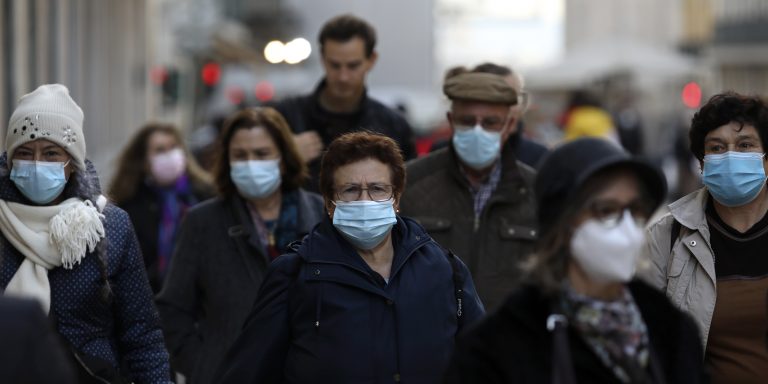INTELBRIEF
November 30, 2021
IntelBrief: Omicron Variant Poses New Threat as Pandemic Drags On

Bottom Line Up Front
- As the world struggles to stem the tide of the pandemic, a new and extremely concerning COVID-19 variant was recently identified in South Africa as a “variant of concern” by the World Health Organization (WHO).
- There are concerns that South Africa is being penalized for its transparency and that the travel ban and other measures will make it less likely for countries to be forthcoming with alarming data in the near future.
- Vaccine nationalism, hoarding of stockpiles, and rampant disinformation have all played a role in the delay of disseminating the vaccine on a more global scale.
- Anti-vaxxers and conspiracy theorists have proliferated and become more militant and dangerous in some countries, including Italy and the Netherlands.
As the world struggles to stem the tide of the pandemic, a new and extremely concerning COVID-19 variant has been identified as a “variant of concern” by the World Health Organization (WHO). Also known as B.1.1.529, and now given the Greek letter “Omicron,” the variant was first identified in South Africa, prompting countries around the world, including the United States, to restrict travel to several countries located in southern Africa, among them Botswana, Zimbabwe, Namibia, Lesotho, Mozambique, and others. There are still many unknowns related to Omicron, including how much more transmissible and lethal it is compared to other strains of the coronavirus, as well as how effective the COVID-19 vaccines will be against the newest strain. The Omicron variant is believed to have as many as 50 mutations, an unusually high number. The number of mutations in the so-called “spike protein” could make the virus far more transmissible and capable of evading immunity from prior infection or vaccination.
Even as countries enact travel bans, cases of the Omicron variant have been identified in the United Kingdom, Italy, Belgium, Australia, the Netherlands, Hong Kong, and Israel, among others. In a statement last weekend, Israeli Prime Minister Naftali Bennett announced a two week ban on the entry of all foreigners into the country. Dr. Anthony Fauci, the head of the U.S. National Institute of Allergy and Infectious Diseases, stated that it is possible that Omicron is already circulating in the United States. There are concerns that South Africa is being penalized for its transparency in alerting international health authorities, and that travel bans and other measures perceived as punitive will make it less likely for other countries to be as forthcoming with data when scientists identify similar variants in the future. Yet, given that the new variant has already spanned globally, such data transparency is necessary to preserve global health imperatives. China was notoriously evasive with data in the earliest stages of the pandemic, a move that essentially ensured the spread of the virus worldwide. U.S. Secretary of State Antony Blinken spoke last week with South African Minister of International Relations and Cooperation Naledi Pandor and emphasized the importance of cooperation and continued partnership. The last significant variant, the Delta variant, wreaked havoc on healthcare systems and national economies, and there is growing concern that Omicron may be even more devastating if countries fail to respond properly and with a sense of urgency.
While many developing countries have had access to COVID-19 vaccines over the course of 2021, most of the Global South has not received adequate doses to vaccinate their populations. Vaccine nationalism, hoarding of stockpiles, and rampant disinformation have all played a role in the delay of disseminating the vaccine on a more global scale. But if the world has learned one thing during the pandemic, it is that countries are only as strong as their weakest link. In a globalized and interconnected world, no borders or bans can prevent the spread of a respiratory virus. The economic implications are also global, as evidenced by the massive dip in the stock market late last week, as news of the new variant spread and investors responded in kind. When poor or developing countries are neglected by wealthy nations in vaccine distributions, the result is further mutations, new variants, and a never-ending cycle of human suffering and economic hardship.
Governments are now forced to grapple with how to properly respond—weighing on one hand the public health fallout, while also considering the societal impacts of further lockdowns, which have generated public backlash and led to demonstrations, protests, and riots. Extremist groups have benefited tremendously from the pandemic, taking advantage of the amount of time people are spending isolated and online to recruit new members and spread propaganda. Anti-vaxxers and conspiracy theorists have proliferated and become more militant and dangerous in some countries, including in Europe. In Italy, Facebook has served as a platform for anti-vaxxers to link up with far-right gangs and anti-government extremists, promoting the narrative that governments are using the pandemic as a way to control their citizens. In October, thousands protested across the country and some rioters attempted to storm a hospital in Rome, where hospital workers were forced to erect a barricade until the police could arrive. With the Omicron variant of COVID-19 rearing its head at the start of a busy holiday season, governments are challenged to rise to the occasion to prevent further surges in case numbers globally.